 |
Previous Issues |
| Cedar Mill Community Website |
|
Search the Cedar Mill News: Search the Cedar Mill News
|
About The Cedar Mill News |
|
|||||||
| Volume 16, Issue 3 | March 2018 |
||||||
Featured Business
|
||||||||||||||||||||||||||||||||||||
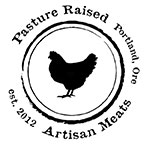 |
In 2012, two families began a big adventure by starting small. John and Rachelle Mathia wanted to buy a small farm so they could feed their family good clean food. John asked his friends Geoff and Amy Scott if they were interested.
“We shared a love for the natural farm life, poultry and being outdoors. We teamed up for the perfect partnership and formed Marion Acres, named after the original land which was in Marion County.”
They started with 32 broiler chicks using the rotational, pastured, “chicken tractor” methods created and popularized by Joel Salatin. “While we've never met him, he's been a real inspiration to us through his books, videos, and articles. We did see him speak several years back down in Salem. We also draw inspiration from Allan Savory, Allan Nation, Wendell Berry, and all our customers!” says Geoff.
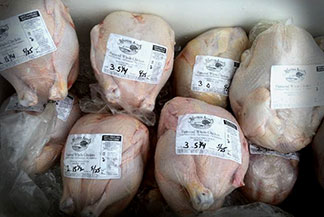 |
| Chilled chickens ready for pickup are shrink-wrapped and labeled. |
Shortly after their first harvest, they got the chance to move to a larger piece of land in the Helvetia area, near the intersection of Helvetia Rd. and West Union. They formed an LLC and sold out their next harvest of 500 chickens.
“In 2016, we added beef, pork, turkey, eggs & Buying Clubs,” John explains. In 2017, John quit his desk job to become a full-time farmer. Geoff is planning to do the same this spring as well. They began offering chickens to chefs and restaurants all over Portland. He adds, “This year, we plan to continue the process of building our own poultry processing facility and farm market on our new 47 acre plot of land.”
In 2011, Friends of Family Farmers championed legislation that allows small farms in Oregon to grow and process up to 1,000 birds on the farm. “That was HUGE for us.” Geoff says. “The work that FoFF did to get that legislation passed meant we could start very, very small. If the bill hadn’t passed, we would have had to build a processing facility, which is not cheap, or used a licensed processor. We just can't say how important the work that FoFF did was. That legislation is still in place and helps small farms all over Oregon get a start in growing chickens.”
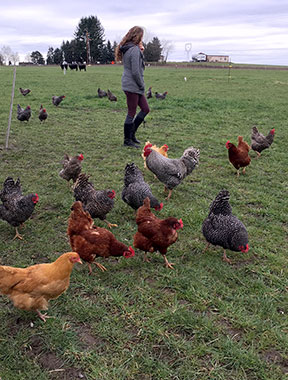 |
With more people embracing the value of eating local food, there’s pressure on state and local governments to adopt policies and regulations that encourage small food producers. Many of the regulations related to food processing are aimed at large growers and farmers. Food processing has become centralized in part because of the cost of meeting those regulations, so the “1000 bird” law was big news.
“Things are changing, though.” John says, “Oregon Department of Agriculture really supports small farms, and have been a huge help.” Oregon State University sponsors the Small Farms Conference and several other programs for small farmers.
“None of us grew up on a farm... that would have been so much easier... maybe not as much fun though! We've learned what we know through books (lots of books), YouTube videos (lots of videos), other farmers in the area who've really been a great help, and trial and error” explains Geoff.
He adds, “We belong to several organizations that have been great sources of information, like the American Pastured Poultry Producers Association.
“We're also participating in an Ecotrust program here in Portland for small farms.” John adds, “They invited us to be part of the Accelerator Program that helps small food producers grow to be medium sized food producers. That is the only way we can make a decent living and ensure we are financially sustainable for decades to come. Ecotrust understands this and is committed to unlocking the mystery of the ‘missing middle’ of food production.”
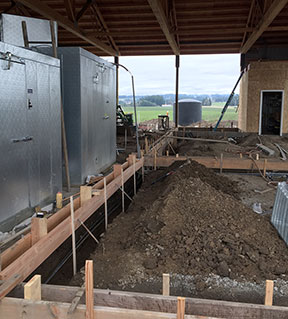 |
| Large walk-in coolers were installed as part of the Market and processing building. Concrete was being poured on March 1. |
Some of Portland’s best restaurants serve your products. How do you satisfy them and still have enough to sell to the public? Is that a challenge?
John responds, “That is THE challenge! We've tried to balance our production with the demand, and fortunately, we have been able to have enough to sell into restaurants as well as to the public, which is very important to us. We don't want to be removed from the person that's eating our products. We want to have a relationship with our customers.
“We've noticed that here in Portland, people buying our chicken want to have a relationship with us too! They want to know where their food comes from and who is raising it. That's why we have farm tours and an open door policy. People should know where their food comes from. Producers like us should be held accountable for the products they send to market. It's been so great and rewarding and we've been able to meet and become friends with so many people all over Portland.”
Geoff says, “The Buying Clubs are something we do to extend our market. We're happy to take our products to different drop points around the Portland area because we know it's not always easy to get across town to the farm. It's honestly just a lot of fun too, being able to work with all those other customers that we would never be able to meet if we didn't do the Buying Clubs.”
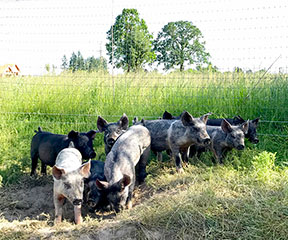 |
| They are raising 25 pigs this year in addition to thousands of chickens. All the animals in a pastured system either consume or provide food for each other. |
Part of their growth plan for this year is a new, much larger brooder, where the newly hatched chicks grow out their feathers for about three weeks, so they are ready to live outside on the pasture.
John explains, “We don't hatch in the brooder... that's a real science and best left to the hatchery. We purchase day-old chicks from Jenks Hatchery down near Corvallis. Aaron Jenks has just taken over the day-to-day operation of the business, and is great to work with. He's become a great supporter of what we're doing, and a great example of how we have really tried to keep things local.
They are also building a new processing facility right on the farm, which will let them increase the number of chickens they can sell. “We hit that 1,000 bird limit several years back and started turning away customers. That's a bad feeling—turning away people— because we can’t grow more than 1,000 birds. So we took the dive and went all-in. Processing our own birds is really important to us. People should know that we take our stewardship very seriously. We want to be responsible for the animals through the whole process. We feel it's our duty to make sure the animals are treated well, and the processing is done humanely and with respect for the bird,” Geoff says.
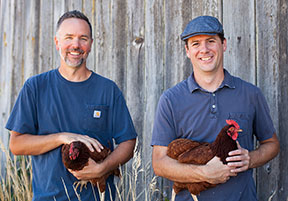 |
| John and Geoff with two of their feathered friends. We don't know if either one is named Colin. |
To get the chickens to the restaurants, they work with a distributor in Portland, Wilder Land & Sea. “They're a bunch of guys who tipped into the whole local food thing here in Portland just like us. They have a real passion for what they do. They deliver inside of Portland, and we take care of deliveries outside of Portland,” explains John.
In addition to the brooder and the processing facility, they’re building a Farm Store to serve as a food hub for the area, collecting all the great produce, and dairy, and other agricultural products produced in the Helvetia area. They hope to open that mid-summer.
I see that part of the delay in opening the processing facility was due to Washington County regulations. Do you feel that the county could do a better job encouraging local food production?
“We have had a long process working with the County. But we found out Washington County has no other processing facility like what we're building. That's not the County's fault! That's a sign that we as a society want our food produced outside of the area. We are working very hard to change that, and our customers are as excited as we are to have food production back in the community.
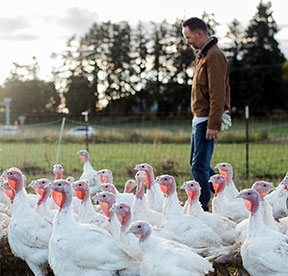 |
| Turkey harvest is timed for Thanksgiving, of course. We can testify that they are delicious! |
“While the County might be able to do a better job encouraging local food production, it's really up to all of us to encourage it. As members of our community, we should be seeking out local producers and giving them our food dollars. Nothing talks like money, and each time someone buys a chicken from us, or carrots from Stoneboat, or strawberries from Helvetia Strawberries, or milk from Schoch Dairy, those dollars are screaming for local food production. As a producer, we're ready to meet the demand!” says Geoff
Your place is in the Rural Reserve of Washington County. Are you concerned about the proximity to the Urban Reserve areas?
“It's important to grow where you're planted.” Geoff answers. “Through a crazy series of events, we've found ourselves planted on the corner of West Union and Helvetia Road. So we'll focus on doing the best we can with what we've been given, and if the land use laws of Oregon present us challenges down the road, we'll meet them with all the energy we can muster. “
John adds “We can't have local food if there's no room for farms. So we hope that, with where we've been planted, we can play our part in ensuring that farmlands are preserved, and utilized for the benefit of the community they're in.”
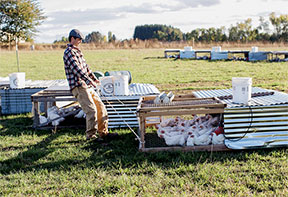 |
| The "chicken tractors" are moved to a fresh patch of grass every day |
Marion Acres chickens and other meats are not cheap. But is cheap food really a good idea? Many of us have been saddened to learn how cheap chicken is produced. And if it means eating a bit less chicken and other meats, or spending more of your income on really good food, that might not be a bad thing.
Plus, pastured chicken just tastes amazing! It can take a little while to get used to cooking birds that run around all their lives, but you’ll feel good about eating them, and boiling down the bones (they even sell feet!) to get every bit of goodness.
For now, you can order chicken, beef, pork, turkey, eggs, chicken parts and more to pick up at the farm or at one of their Buying Club locations. When the Farm Store opens, they’ll have regular hours.
Anything else you want us to know about?
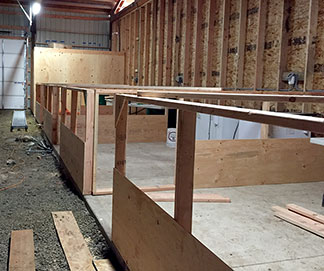 |
| The brooder building will nurture chicks until they are ready for the pasture. |
“Yes!” They both exclaim. “Know your farmer. Stop by and meet us! We want to meet as many people as we can in the community, even if you don't buy anything from us. If you want to stay up on all that we're doing, sign up for our email list on our website, MarionAcres.com. You can also follow us on Instagram for frequent updates, and on facebook. Finally, if you're skeptical about our production methods, or if you think our products are too expensive... basically if you aren't convinced... stop by! Give us a chance to convince you. We'll show you what we're doing, and we'd love the opportunity to tell our story. We are also on several websites like LocalHarvest and EatWild where we get a lot of customers who are just searching the web for a local source of quality meat.”
Read much more about their philosophy, methods and plans on their website, and sign up to get some chicken!
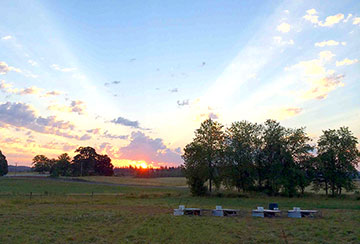 |
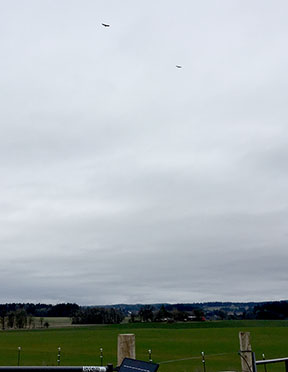 |
|
| Sunrise over the farm | Bald eagles like chicken too! Predators are a continual problem. | |
 |
||
| The new pasture is ready for this season's animals | ||
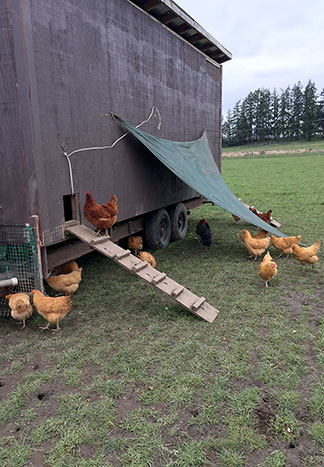 |
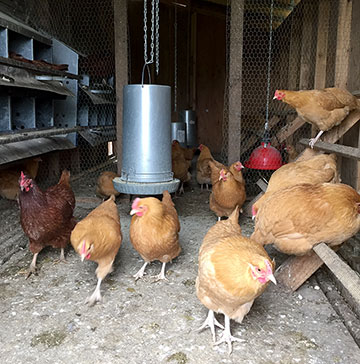 |
|
| The winter mobile coop provides shelter and food | Chickens move freely between pasture and the shelter and food of the coop. | |
![]()
Like us on Facebook for timely updates
Published monthly by Pioneer Marketing & Design
Publisher/Editor:Virginia Bruce
info@cedarmillnews.com
PO Box 91061
Portland, Oregon 97291
© 2013